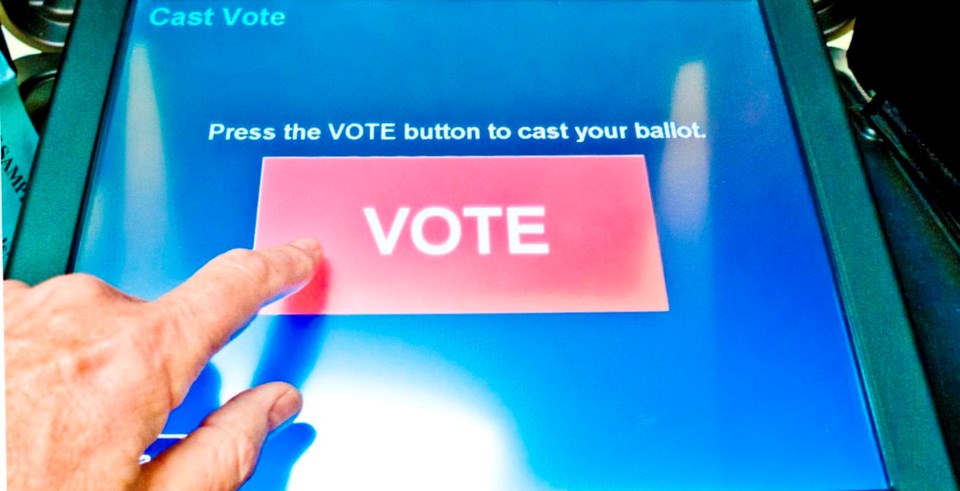Despite a slowdown that caused online voting during the municipal election to crash in about 50 communities around Ontario, including Bradford West Gwillimbury, it is still the best bet for increasing voter turnout, said one researcher.
“It does increase voter turnout by 3.5 per cent. It doubles if voting by mail was not put in place beforehand,” said Nicole Goodman, an assistant professor of political science at Brock University, who is the lead researcher for two online voting studies.
“When multiple methods are offered alongside each other … for the most part, voters gravitate toward online voting. As we see our society become increasingly online and more digital, (we must ask), ‘What do we need to do to maintain voters?’”
Goodman is currently working on an Electronic Elections Project, in which the Town of Bradford West Gwillimbury is participating, to survey electors, non-voters and candidates on their opinions of online voting before and after the recent municipal election.
The study will examine what happens when elections are moved to online formats, such as Internet voting, and whether that changes political attitudes, who votes, and who is elected.
“Canada is the only country in the world where paper ballots have been eliminated,” Goodman said.
While the Electronic Elections Project is ongoing, Goodman is currently wrapping up work on an Internet Voting Study, which about 50,000 people completed after they finished voting in October’s municipal election.
In light of the glitch, which netted widespread criticisms for Dominion Voting Systems, the company responsible for online voting in all of the affected communities, Goodman said participating in such a survey would give electors a chance to voice their frustrations and concerns — meaning municipalities would then have access to that feedback for future policy consideration.
It is the second time Goodman has run the Internet Voting Study. In the 2014 election, about 26,000 people completed it after voting, she said.
Bradford opts out of online voting survey
The Town of Bradford West Gwillimbury opted out of participating in the survey, which offered general results for free, or a document outlining a participating community’s results for a fee.
Rebecca Murphy, the Town of BWG’s clerk, said the town decided against participating because it conducted its own exit survey with residents.
With online and telephone voting being new to BWG this year, she added, the town did not want to confuse people.
“It was quite a long survey. We didn’t want to add an additional layer of confusion,” she said, adding the town also did not want to slow down the Voter Help Centres set up around town.
In Newmarket, the survey, which had about 25 questions, was criticized for being “annoying,” “long,” “irrelevant,” and “intrusive” by some voters, although about 36 per cent of electors there completed the survey in this year’s municipal election.
Some of the questions on the anonymous survey were about paper voting versus electronic voting, and others asked about trust in government to do the right thing, political leanings, online activities, self-identification and disability status, and the type of home Internet used.
But as the use of online voting increases, Goodman said she is “really excited to look at the data” to help provide communities with information on how to improve the experience.
She said municipalities — or even the province — can potentially use the data from her study to create documents or resources to boost technical knowledge in the community, or put together technical, operational and legal guidelines for online voting in Canada.
Goodman said she plans to do a third survey in the next election to compare data again. She expects to have her study of online voting in the 2018 municipal election done in six months.
Online voting ‘transformed’ voter turnout
Online voting has exploded in certain communities across the country, with the City of Markham being a prime example, she said.
Markham was the first Ontario municipality to switch to online voting in 2003, she said. As a result, it boosted voter turnout 300 per cent in the advanced polls.
In 2006, voter turnout in Markham spiked 43 per cent, she said.
“It transformed their voter turnout” from a couple 1,000 to 10,000 voters, Goodman said.
In 2003, only 12 Ontario municipalities ran some form of electronic election.
Today, 194 towns and cities, out of 414 that are in charge of running their own elections, have switched to Internet voting.
Why did BWG voter turnout decrease?
In BWG, the voter turnout in this year’s municipal election was 33.5 per cent, with 8,219 votes cast.
For comparison, about 8,800 people cast their ballots in BWG’s last election, according to statistics provided by the town.
Although voter turnout decreased, Goodman said there are many factors in voter turnout, including whether mayoral races are competitive.
Murphy said she does not believe online voting or the glitch on Election Day had anything to do with turnout.
“The biggest impact on voter turnout was sort of the uncontested mayoral race,” she said, adding about 1,200 people voted during the 24-hour extension period after the online voting crash was fixed.
“Most people could use online voting. It was easy,” she said. “I was pleasantly surprised that the highest group of voters was 65 and older. They’re the ones using the Internet. They vote no matter what voting method you use.”
Electors aged 18 to 20 also made up “quite a few” of the votes as well, she said.
The 25- to 40-year-old voters had the lowest local turnout, which Murphy said is likely because they are “busy with life.”
How did BWG pick Dominion Voting Systems?
As for Dominion Voting Systems, how did the Town of BWG come to use it for the municipal election?
“We used Dominion for our 2014 election (for its vote tabulators). We were able to extend our 2014 pricing,” Murphy said. “It would be a tendered thing next time. There’s only so many providers out there.”
— With files from Kim Champion
